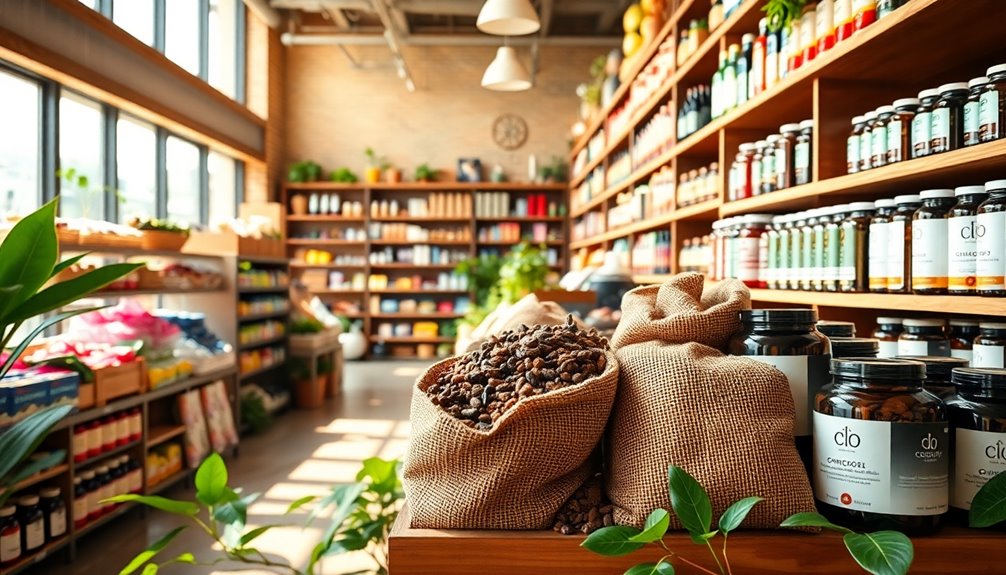Decaf coffee is made through various methods, such as water, solvents, or supercritical carbon dioxide, that carefully remove caffeine while preserving flavor. This process allows you to enjoy coffee without jitters or sleep issues, as decaf contains much less caffeine. Decaf often tastes milder but still offers rich aroma and benefits like antioxidants. To find out how different methods impact flavor and health, explore the steps and advantages behind decaffeination in detail.
Key Takeaways
- Decaffeination uses methods like water, solvents, or supercritical CO₂ to remove caffeine while preserving flavor.
- The process ensures minimal flavor loss and varies in complexity, cost, and environmental impact.
- Decaf coffee reduces jitters, supports better sleep, and helps manage caffeine dependence.
- Flavor profiles of decaf differ from regular coffee, often milder with less acidity, depending on the method used.
- Choosing decaf offers health benefits and enjoyment without the side effects of caffeine.
Methods for Removing Caffeine From Coffee

There are several methods to remove caffeine from coffee, each with its own advantages and drawbacks. The process begins with specialized decaffeination equipment designed to efficiently extract caffeine while preserving flavor. Caffeine extraction techniques include solvent-based methods, where chemical solvents like methylene chloride or ethyl acetate are used to dissolve caffeine, and the Swiss Water process, which relies on water and osmosis to remove caffeine without chemicals. Another approach is supercritical carbon dioxide extraction, which uses pressurized CO₂ to target caffeine molecules selectively. These methods vary in complexity, cost, and impact on coffee’s taste profile. Choosing the right technique depends on factors like desired purity, environmental concerns, and equipment availability. Each approach aims to balance caffeine removal with maintaining coffee’s original flavor.
The Decaffeination Process Step-by-Step

The decaffeination process involves several precise steps to remove caffeine while preserving the coffee’s flavor. First, green coffee beans undergo caffeine extraction techniques, often using water, solvents, or supercritical CO2, depending on the decaffeination technology. These methods allow caffeine to be selectively extracted without harming the beans’ aromatic compounds. Additionally, the effectiveness of the process relies heavily on the decaffeination technology used to ensure minimal flavor loss. Modern methods such as supercritical CO2 extraction are particularly effective at maintaining the beans’ original flavor profile, ensuring a high-quality decaf product. The choice of method can also influence the overall environmental impact of the decaffeination process, with some techniques being more eco-friendly than others. Implementing sustainable practices in decaffeination can further reduce the environmental footprint of coffee production. Moreover, advancements in eco-friendly methods continue to improve the sustainability of decaffeination.
How Decaf Coffee Affects Your Body

Decaf coffee offers a way to enjoy your favorite brew without the jitters or sleep disruptions often caused by caffeine. Since it contains markedly less caffeine, it can help you maintain a healthier caffeine tolerance over time, reducing the risk of dependence. Drinking decaf in the afternoon or evening is less likely to interfere with your sleep quality, allowing you to wind down more easily. If you’re sensitive to caffeine, decaf provides a way to savor the flavor without upsetting your body’s natural rhythms. Keep in mind, though, that small amounts of caffeine might still be present. Overall, decaf coffee supports your body’s balance by offering the taste you love while minimizing caffeine-related effects on your body. For those seeking a relaxing experience, choosing decaf can be especially beneficial during evening hours. Understanding industry trends can help you make informed choices about your coffee consumption. Additionally, being aware of decaffeination methods can help you select higher-quality decaf options. Advances in decaffeination technology continue to improve the flavor and safety of decaf coffee, making it a more appealing choice for consumers.
Comparing Flavor Profiles: Decaf vs. Regular Coffee

While decaf coffee undergoes processes to remove most of its caffeine, it also influences its flavor profile, often resulting in subtle differences from regular coffee. You might notice slight flavor nuances that set decaf apart. These taste differences can include a milder body or less pronounced acidity, depending on the decaffeination method used. Some people find decaf smoother and less bitter, while others detect a faint aftertaste from the extraction process. The roasting level and bean origin further shape these distinctions. Additionally, the decaffeination process can impact the overall flavor integrity, similar to how ethical hacking aims to identify vulnerabilities in systems to improve security. The decaffeination method used can also influence how closely decaf resembles its caffeinated counterpart in flavor profile. Furthermore, processing techniques can affect the preservation of aromatic compounds, contributing to the final taste experience. Interestingly, the choice of decaffeination process can also affect the retention of natural antioxidants, impacting health benefits.
Benefits of Choosing Decaffeinated Coffee

Choosing decaffeinated coffee can be a smart option if you want to enjoy your favorite brew without the jitters or sleep disturbances that caffeine can cause. It also helps reduce the risk of caffeine withdrawal symptoms if you’re trying to cut back gradually. Many decaf coffee myths suggest it’s completely caffeine-free, but it actually contains small amounts—making it suitable for sensitive individuals. Drinking decaf can still provide antioxidants and flavor benefits without the stimulating effects of caffeine. Plus, it’s a great choice for late-afternoon or evening coffee moments, supporting better sleep. Overall, choosing decaf allows you to savor coffee’s taste and health benefits while avoiding the drawbacks of caffeine dependence. Incorporating aesthetic serveware and table linens in your coffee setup can enhance your drinking experience and make it more enjoyable. Additionally, selecting decaffeinated coffee may be beneficial for those concerned about nutritional content and its effects on health. Recent innovations in AI-generated content are also making it easier for consumers to discover personalized coffee recommendations and brewing tips. Moreover, understanding glycolic acid products can help you optimize your skincare routine without excess stimulation, aligning with a balanced lifestyle. Furthermore, opting for decaf can support heart health, as some studies suggest a modest benefit in blood pressure regulation.
Frequently Asked Questions
Is Decaf Coffee Suitable for People With Caffeine Sensitivities?
If you’re caffeine sensitive, decaf coffee can be a good choice since it contains much less caffeine. It’s generally suitable for those with health considerations related to caffeine, but keep in mind that it’s not completely caffeine-free. Check labels and opt for brands that use gentle decaffeination methods. Always listen to your body and consult your healthcare provider if you have concerns about caffeine sensitivity or other health issues.
How Long Does Decaf Coffee Retain Its Caffeine Content After Brewing?
After brewing, decaf coffee retains most of its caffeine content for about 30 minutes to an hour, depending on brewing techniques. You’ll notice the coffee flavor remains fairly consistent during this time, but the caffeine gradually diminishes. If you want to enjoy the full caffeine effect, it’s best to drink it soon after brewing. Proper storage can also help preserve flavor and caffeine, ensuring a satisfying cup every time.
Can Decaf Coffee Be Made at Home Using Simple Methods?
Like a modern alchemist, you can make decaf coffee at home using simple methods. Home brewing with water and decaffeinated beans is straightforward and doesn’t require fancy equipment. You can try the Swiss Water process or chemical-free methods like the direct solvent method if you prefer. With just a coffee maker or French press, you’ll enjoy decaf that’s fresh and tailored to your taste, right in your own kitchen.
Are There Any Health Risks Associated With Decaffeinated Coffee?
You might wonder if decaf coffee has health risks. Generally, it’s safe for most, but be aware of potential health implications like acid sensitivity or stomach issues. Some people may have allergy concerns related to additives or residual chemicals used in decaffeination. Always check labels, especially if you have allergies or sensitivities, and consult your doctor if you’re unsure about how decaf coffee might affect your health.
Does Decaf Coffee Contain Trace Amounts of Caffeine?
Yes, decaf coffee does contain trace amounts of caffeine due to residual caffeine residue left after decaffeination. While most of the caffeine is removed, small amounts may still be present, usually around 2-5 milligrams per cup. These traces generally don’t cause decaffeination side effects for most people. If you’re highly sensitive to caffeine, it’s good to be aware that even decaf can have minimal caffeine content.
Conclusion
Decaf coffee offers a flavorful way to enjoy your favorite brew without the caffeine jitters. For instance, imagine Sarah, who loves her morning cup but needs to cut back on caffeine. Switching to decaf allowed her to savor her routine without disrupting her sleep or anxiety. Whether for health reasons or personal preference, choosing decaf can fit seamlessly into your lifestyle while still delivering the rich taste you crave.









